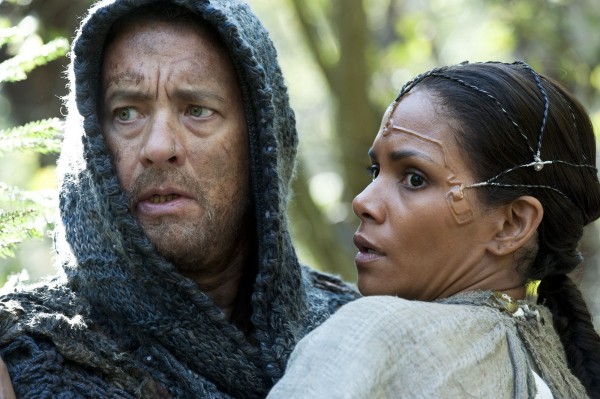Imagine watching a film that combines various story elements such as a political thriller, a sci-fi adventure or even a British sitcom? That is exactly what you get from Cloud Atlas, the Wachowski sibling’s bold and daring fantasy epic which continues their trend of visually-driven films that they previously achieved with The Matrix trilogy (1999-2003) and Speed Racer (2008). While it failed to land any nominations at the recent Oscars, it has quietly gained momentum as an artistic masterpiece that explores the way that souls are connected throughout its several segments. An appealing cast that includes Tom Hanks, Halle Berry, Jim Broadbent and Hugh Grant adds extra spice to this voyage of a film….
SYNOPSIS: Split into six different plot-lines, the film focuses on how the actions of individuals affect one another in the past, present and future. In 1849, writer Adam Ewing (Jim Sturgess) tries to protect a black slave who has secretly boarded his ship that is sailing around America. In 1930s England, homosexual music writer Robert Frobisher (Ben Whishaw) agrees to work with veteran composer Vyvyan Ayrs (Jim Broadbent) as he creates the Cloud Atlas theme. In 1970s America, journalist Luisa Reys (Halle Berry) tries to expose corruption at a nuclear plantation only to be pursued by hitman Bill Smoke (Hugo Weaving). In modern day England, publisher Timothy Cavendish (Broadbent) tries to sort out a massive debt only to be confined to an old people’s home by his wealthy brother. In 2144 Seoul, fabricant clone Sonmi-451 (Doona Bae) is rescued from her built-in environment by revolution fighter Hae-Joo Chang (Sturgess). Finally in the faraway future, tribesman Zachary (Tom Hanks) reluctantly helps a modified human named Meronym (Berry) as she tries to track down an ancient building.
Audacious is one way to describe Cloud Atlas as the Wachowskis carefully work hard to make this ‘unfilmable’ production a reality by adapting it from David Mitchell’s best-selling novel. It demands a lot of attention from its curious audiences as they spend the next three hours intrigued and fascinated by this lavish epic and while the storylines are all completely different, the directing trio (including Tom Tykwer) manage to combine and intertwine the plots together rather than playing off each story as an individual one. Fortunately the mood of each part changes throughout as it goes from dark and thrilling to subtle and at times hilarity (especially when it comes to the Cavendish scenes). A sense of ‘freedom’ also connects the segments and becomes a running theme as we begin to realise that these stories do have something in common e.g. Sonmi’s legacy being worshipped by the tribe. But what also makes this film remarkable is the way it merges together a talented group of actors and has them taking on several roles that mostly rely on tons of costumes and prosthetics. It also pulls off the visual effects scenes spectacularly well with the stunning futuristic Seoul sequences baring resemblance to the sci-fi world of Blade Runner (1982). On occasions, the makeup is completely inspired as we barely recognise some of the big names like Halle Berry as the white relative of Vyvyan in the 1930s or Hugh Grant as a sadistic warrior in the final story. While the film stands out as a rich and artistic triumph, the exceptional cast manage to contribute effectively in their multiple roles. Tom Hanks has a lot of fun as his different characters range from a corrupted doctor and a volatile Irishman to a heroic tribesman. Fellow Oscar-winner Berry reclaims some acting versatility from her Monsters Ball days courtesy of her different portrayals including the determined journalist from the 70s segment. Young British actors Jim Sturgess and Ben Whishaw continue to impress with their story arcs while Hugh Grant goes-against-type to play some creepy and sadistic villains who make us detest them whatever story they are in. However the two best performances come from British character actor Jim Broadbent and Asian actress Doona Bae. The former brings humour and weariness to his character Cavendish who is initially portrayed as a buffoon but manages to make us root for him as he finds himself in the awkward setting of an old people’s home. Bae on the other hand is immaculate as the fabricant who begins to realise what her life has become and ultimately makes the gradual decision to try and inspire a revolution.
However the problem with a film of this magnitude is that it isn’t easy to sit through. Some audiences may find watching the non-linear narratives a struggle to work out especially as you wonder about what exactly links them all (it’s best to rely on IMDB for that!). Paying attention to that many storylines definitely requires a lot of patience and understanding even from the most intelligent film fans! While the makeup has its inspired moments, it can also be somewhat laughable and even racist at times particularly when the focus is on the Seoul segment. One can’t help but feel sorry for Asian star Doona Bae as she finds herself sharing scenes with non-Asian actors covered in prosthetics who clearly look like they have just stumbled off the set of a Charlie Chan film. But it is poor Hugo Weaving (Agent Smith from The Matrix) who finds himself looking silliest of all not just in that story but also when he is in full-drag to portray the Nurse Ratched-type carer from the Cavendish scenes and his later appearance as a creepy and unnecessary demon from the final segment.
VERDICT: The Wachowski’s latest offering is confidently acted, looks majestic to watch and has the potential to be a genre-breaking classic but is flawed by its complicated narrative and inconsistent makeup. It may take a few rewatches to appreciate this one better!


Be the first to comment on "Cloud Atlas (2012) – ★★★ (1/2)"